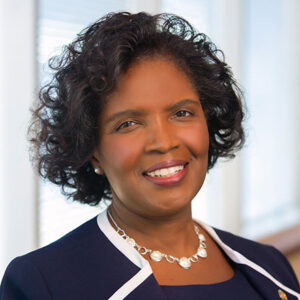 Karen Smith, MD, PA
Karen Smith, MD, PA Physician Owner
Raeford, North Carolina
Dr. Karen L. Smith has been a physician in private practice in Hoke County for more than 30 years, working tirelessly to improve access to quality healthcare services for residents of rural communities, including efforts to prevent diabetes, overcome COVID-19 vaccination hesitancy, and expand telehealth. Her pioneering work to implement innovative healthcare programs and advocate for policies that address the unique healthcare challenges faced by rural areas has made a profound difference in the lives of countless individuals. Dr. Smith has been recognized for her contributions with numerous awards, including the 2016 North Carolina Family Physician of the Year and the 2017 American Academy Family Physician of the Year.
As the lead Family Medicine Physician in the practice and Hoke County Medical Director, I model and facilitate healthcare delivery services that optimize the health and well-being of people served in the community. Through policy development and cross-discipline collaboration with both physical and mental health, we are able to address the needs of civilian and military-dependent citizens in the region and beyond our boundaries.
Our team is reaching out to individuals who are often silent participants in rural life. The positive impact is revealed when we can derive solutions based on the science of Family Medicine and apply them to the rural location. Even greater is to share our knowledge and experience with other rural providers and medical students who are mesmerized by our joy in practice. It was heart-warming to hear our outcome data shared at a local hospital system medical staff meeting by the CEO, noting that consistent physician presence in Hoke County may be the reason for several disorders, such as infant mortality and immunization rates, realizing improvement over twenty-five years. We review the Healthy North Carolina 2030 report and seek strategies for improving regional indicators via direct provision of care and indirect collaboration with other service providers, including education, law, military, and many more.
The “Power of Rural” for me suggests that while we may be remote in locale, we are close in the heart. We truly care about and for others.
My family is from a rural environment, and the difficulty accessing healthcare has always been a problem. My birth actually happened at my aunt’s house due to the hospital being a forty-five-minute drive into the city! I observed the demise of family and friends at a younger-than-expected age, and medical school taught me that much of it was preventable. I am convinced we can achieve health and well-being for our communities if given the right tools, people, and spirit to care for people as part of their trusted team.
The NC Office of Rural Health is a major force for my professional success in Hoke County. They are a team that not only supports provider placement and sustainability but also understands the community’s needs for an ideal match. My family came to Hoke in 1992, and two generations later, we are still growing and thriving; I believe we matched!
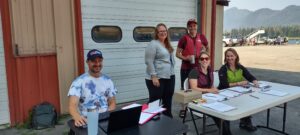 Philip Hofstetter, Au.D
Philip Hofstetter, Au.D CEO
Petersburg Medical Center
Petersburg, Alaska
Phil’s leadership, dedication and advocacy as CEO of Petersburg Medical Center (PMC) are making a big impact on a small rural community. Phil is always looking for creative solutions to problems and is determined in his effort to secure resources to support the hospital and the community to improve health. He promotes collaboration between different programs/departments and creates a positive culture. He seeks grant funds from many different sources to allow the hospital to meet a variety of community needs that extend well beyond traditional medical care. Phil is a tireless advocate for rural health care and the health of the community.
Petersburg Medical Center makes a major difference in the community by serving patients in the hospital and empowering health and wellness through collaborative partnerships and meeting patients where they are in their healthcare journey. This includes accessible care at home (home health), health education and focus on prevention and wellness activities.
During COVID, there was a tremendous challenge in addressing community childcare needs. After a “community cafe” conversation, PMC worked with a local childcare outdoor activities program called “Kinder Skog” and, based on hospital board support, brought them into the PMC Wellness Department. This allowed the program to grow, built up sustainable employees and offered more kids the opportunity to participate in this outdoor activity-based program (which greatly helped even more families). In one year, the program doubled in size and is wildly successful, combining childcare with a strong focus on youth wellness. It has garnered interest from many healthcare organizations across the state as an example of unique programs to improve employee retention.
As an audiologist initially, I joined a private practice early in my career in New York and found it unfulfilling. I moved to rural Alaska in 1998 and found my calling serving small rural communities for 14 years before taking on hospital administration. The ability of rural health is a cornerstone of every community, and rural health has a greater achievable impact on the community as a whole.
To me, the “Power of Rural” means empowering those in the community on their journey to health and well-being. This involves providing them with the necessary access, tools, and resources to take charge of their own health and that of their community.
I have established a strong partnership with the State Office of Rural Health, and this collaboration has played a pivotal role in facilitating community discussions. They have generously furnished us with essential resources and support for various grant applications and information, as required. Additionally, PMC’s cooperation extends to working closely with the state’s public health department to implement our programs and community initiatives and provide them with office space in our facility.
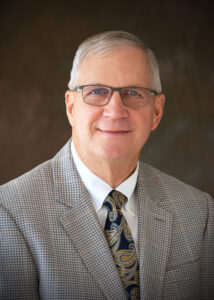 Tom Crowley
Tom Crowley Senior Executive Consultant
Gundersen St. Elizabeth’s Hospital and Clinics
Wabasha, Minnesota
In my 52 years at St. Elizabeth’s (a Critical Access Hospital), our goal has been to bring high-quality, compassionate healthcare to our rural service area. St. Elizabeth’s has been a leader in preventative services to improve the community’s health. Governor Tim Pawlenty named our community the first “Fit City” in Minnesota because of our leadership in wellness.
We consolidated our hospital with the attached clinic to form one team to service the healthcare needs of our area. Community support was instrumental in the success of this initiative. In addition, while staffing shortages in rural areas can be challenging, our scholarship program and the many intern programs that we have sponsored have been very helpful. We have partnered with local universities and technical schools to offer clinical rotations.
As a small rural healthcare provider, we have been a leader in bringing mental health services to our community. A full-time psychiatrist was hired in 1993, and we currently employ a part-time psychiatrist and a licensed clinical social worker to round out our Behavioral Health team. Soon, we will utilize the ITP program (Integrated Telehealth Partners) for the provision of telehealth-based psychiatric and mental health professional services.
Working with our entire service area in partnership with communities, public health, schools, and churches to meet healthcare needs. People helping people.
An outstanding service area that truly supported our rural healthcare facility. This is an area where, as a team, we have made a difference in the lives of the people we serve.
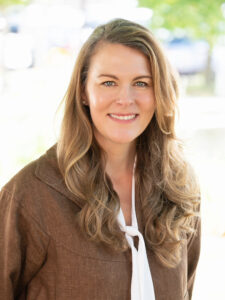 Claire Parde
Claire Parde Executive Director
The Healthcare Consortium
Hudson, New York
I serve as the Executive Director of the Healthcare Consortium (HC), a Rural Health Network that serves the residents of two rural counties in New York. The HC helps people get and stay healthy by addressing the common barriers they face when trying to access care. This work, accomplished through a variety of programs, often involves what we call “way-finding” -helping people navigate a complex and seemingly opaque system. My own work is focused on assessing the community’s health status and needs and determining whether our system is adequate to meet those needs. When gaps in services are identified, we work in partnership with public and private health and human service providers to fill those gaps.
Early in my tenure, the HC was provided a grant by HRSA to conduct a feasibility study to determine if there was sufficient need for a new access point to a Federally Qualified Health Center (FQHC). The study relied on the input of a wide array of stakeholders, which served as the basis of a successful application for new access point funding by an area FQHC. In this way, we were an important part of bringing a new health resource to our community.
The HC is best known for its Children and Adults Rural Transportation Service (CARTS), which helps residents of all ages, incomes, and abilities by providing non-emergency medical transportation. As this program is over 20 years old, we are frequently called upon to provide technical assistance to other rural communities trying to address a lack of transportation.
For many years, our organization’s sole sources of revenue were cost-reimbursement contracts from the public sector. While relatively steady and predictable, the concentration of revenue from essentially one source “baked in” a threat to the organization’s financial stability. We made a successful effort to diversify our revenue, which helps support administrative functions and provides us with greater flexibility in programming.
To my mind, the “Power of Rural” refers to the power of rural people- who can be amazingly cooperative, resourceful, and resilient. One of the most amazing things about working in rural areas is that it is very relationship-driven, and it’s those relationships that are often the foundation upon which some really good work is built.
 Nikki Seibert
Nikki Seibert Owner & Director
Wit Meets Grit & Growing Local SC
Greenville, South Carolina
As the owner of Wit Meets Grit, I have the honor of working on various projects centered around local food systems, equity, non-profit management, facilitation, and network weaving. My primary project is for Growing Local South Carolina as the statewide Network Director. This network actively seeks and supports leadership from rural communities, elevates the needs of rural communities into state-level programs, facilitates connections between rural farmers and local food hubs, and supports the growth of programs that leverage local food, farming, and gardening as part of their public health initiatives.
Wit Meets Grit and Growing Local South Carolina were able to collaborate with the leadership at the South Carolina Department of Agriculture to ensure the SC Local Food Purchase Assistance Program integrated the perspectives of rural communities, contracted with local food hubs serving rural communities, and engaged with food access agencies in rural communities. I partnered with the SC Food Hub Network, the SC Food Policy Council, the Rural Resource Coalition, the Catawba Indian Nation, the SC Black Farmers Coalition, and the Pick42 Foundation to ensure representation was engaged at the leadership level. While this project is ongoing, we know it has been successful based on the partnerships it has catalyzed and the volume of products purchased from socially disadvantaged farmers (~60%) for distribution into rural communities. At the completion of the program, the state will have purchased $13.2 million of locally sourced food into underserved communities in South Carolina.
South Carolina is known for its beautiful rural landscapes, but according to American Farmland Trust, it ranks as one of the top states at threat of losing farmland due to development. Our rural landscapes can support a variety of conservation-minded industries, from timber and tourism to agriculture and alternative energy. While there is power in all of these, our current health crisis creates a need for access to healthy food options, creating a demand for an agricultural sector to feed our communities while creating local jobs. Rural communities have the power to lead the way in reimagining our food system from farm to table and preserving farmland in the process.
The SC Office of Rural Health has been an incredible resource to me professionally in my work and with the larger network of food, farming, and health organizations I serve. Over the years, I have had the pleasure of working with several of their team members, all of whom have approached their work with a collaborative spirit and strong technical expertise. Their Blueprint for Health program directly supported clients in realizing their goals of increasing food access and is responsible for the launch of a very successful food box program. Currently, I work with their team on facilitating collaboration around county-level coalition building and the development of a rural food access toolkit.
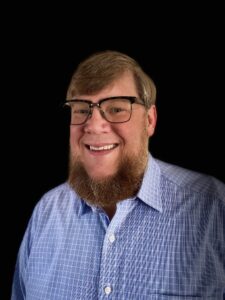 Jason Lillich
Jason Lillich Executive Director
Three Rivers Mental Health and Chemical Dependency Center
Lemmon, South Dakota
I am the executive director, clinical director, and therapist for Three Rivers Mental Health and Chemical Dependency Center. Three Rivers provides behavioral health services to four counties in the designated catchment area, including the two native nations of Cheyenne River and Standing Rock. All communities served are rural or frontier.
We provide mental and behavioral health services to individuals and find ways to make these services accessible, such as meeting in-home and using telehealth and telephonic sessions when connectivity or technology is a barrier.
We have collaborated with law enforcement agencies in each county in the catchment area, offering training on mental health-related topics and providing tablets to deputies to connect individuals in crisis with a counselor via telehealth. This option allows for a more rapid response, reducing logistical and travel limitations, as the distance to some communities can be up to a two-and-a-half-hour drive one direction, with travel being difficult in the winter months. Connecting with individuals in crisis, through the use of a tablet, supports not only a more rapid response but also the ability to help meet the presenting needs of the individual post-crisis, connecting them with localized mental and behavioral health services.
To break down mental health stigma, we collaborate with area schools, churches, EMS, and a local volunteer group to target mental health awareness and suicide prevention. We facilitate free suicide prevention training for the public, local businesses, and schools. Other collaborative efforts with EMS have included promoting 988 and putting signage in all businesses. We have since seen an increase in the number of individuals reaching out for services. We know this has been a success from our receiving emergency crisis calls where the caller reported seeing the signage in the bathroom and chose to call for help.
What contributed to the success has been the collaboration with other entities and increased community involvement. Community buy-in is paramount when trying to create change, and their involvement publicly demonstrates their direct support.
Rural people and communities are resourceful and resilient, with a willingness to help others.
Growing up in a rural community has given me an appreciation and respect for the people and communities in rural and frontier areas.
 Pamela King, BS, CRHCP
Pamela King, BS, CRHCPDirector
Phoebe Sumter Ellaville Clinic
Ellaville, Georgia
I’m the Director of the Phoebe Sumter Ellaville Clinic’s Rural Health Clinic and the Georgia Farmworker Health Program. I provide administrative and operational support to the program.
With the leadership and support of Phoebe Sumter Medical Center’s CEO, Carlyle Walton, and VP Controller, Michelle Doggett, we’ve positively impacted the community. We relocated to a new facility in August 2017 and can provide various services to the rural health community, including EKGs, bloodwork, women’s health, and Vaccines for Children (VFC). We accept walk-ins and provide services on Saturdays to ensure patients have every opportunity to receive care.
We worked with the Sumter County Health Department to conduct a free community health fair. We performed blood pressure and glucose tests, height/weight checks, and STD/HIV testing. I knew we were victorious because of the number of participants and the community’s praise afterward. The advertising, support from the community, and dedicated staff contributed to our success.
The “Power of Rural” means helping a needy community by providing excellent medical care and services.
I was inspired to work in rural health because it allows me to do the two things I love: helping people in need and being of service to the community.
I’ve worked on numerous projects through the SORH office in Cordele for many years. They’ve assisted me with grant purchases and general advice regarding the program. They are very knowledgeable and are excellent resources.
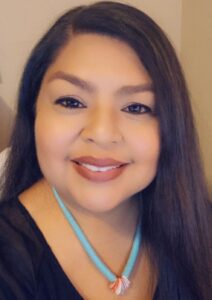 Holly Figueroa
Holly Figueroa Tribal Liaison, Blue Cross Blue Shield of Arizona Health Choice
President, Arizona Rural Health Association
Flagstaff, Arizona
As the Tribal Liaison for Blue Cross Blue Shield of Arizona (BCBSAZ) Health Choice and the President of the Arizona Rural Health Association (AzRHA), I work to strengthen tribal relations with tribes, focusing on access to care, prevention, coordination of care, nation building, training and education, health disparities and stigma reduction, and cross-sector tribal collaborative efforts. I also focus on rural communities and rural health issues.
I work hard to promote cultural humility in all areas of health and wellness. This is key to building trust and relationships within our healthcare systems and those they serve. The organizations I am a part of make a difference through advocacy, education, and collaboration. We have opportunities to communicate with legislators to discuss rural and tribal issues. Additionally, AzRHA secured a grant to participate in the All of Us Program and worked with students to collect and study data to improve health.
The Arizona Center for Rural Health collaborated with AzRHA to host the Federal Office of Rural Health Policy Region D meeting, bringing together nine states and multiple federal and national partners to discuss critical healthcare system transformation issues. As part of the meeting, I coordinated a tour of the Hopi Reservation to provide a firsthand experience of what accessing health care in a rural tribal community is like. We visited a village on the mesa and the local health care clinic, and we met with village leadership, tribal program leaders, and Indian Health Service leadership/professionals. This experience created awareness of how tribes can leverage culture in their respective health journeys. It helped to create connections between NOSORH, other State Offices of Rural Health, and Arizona rural leaders. This project wouldn’t have been possible without established relationships with tribal leaders, tribal programs, and other rural health organizations.
BCBSAZ Health Choice is currently working to address maternal health as a health disparity, as the lack of obstetric services is a big challenge. I am addressing it from an indigenous and rural perspective, exploring programs and doula services to increase access to care. Additionally, I am a certified Mental Health First Aid trainer in the Adult, Youth, Indigenous Youth, and Veteran disciplines, and I have trained across Arizona since 2016. I love empowering communities to care for one another, especially in rural areas where there aren’t always quick response times.
“Power of Rural” is community. Rural communities are places where people know one another and are able to come together.
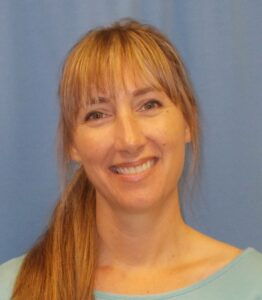 Lisa Rantz
Lisa Rantz President
Hawaii State Rural Health Association
Hilo, Hawaii
I have served as President of the Hawaii State Rural Health Association for the past four years. When I took on the position, the Association was all volunteer-led and only received a $9,500 grant from the National Rural Health Association. The Association now has multimillion dollars’ worth of grants and a full-time Executive Director, two full-time program coordinators, and two part-time staff members. I love to build systems that support access to high-quality healthcare services close to home. This is an essential right that all of our rural residents deserve.
One positive impact is finally obtaining county-wide Health Professional Shortage Area (HPSA) designations for all our rural counties across the state. The designations went into effect in January 2020, and the first 10% automatic quarterly payment went out to providers and healthcare organizations in March 2020 – just as the pandemic shut down our state. This payment helped to bridge the gap until emergency funding came in to help keep medical providers in practice. This is just one way we help support a robust healthcare workforce and keep access to healthcare services available for rural residents.
Our coordinated healthcare assessment, Access to Care, involved bringing together traditional healthcare stakeholder groups, non-profit service organizations and community members to develop surveys for providers and community members to have their voices heard and indicate if they are able to receive health care when they need it on the island or if they had to fly off island for care. We also gathered data on whether rural communities were better or worse off since the pandemic. The service groups were helpful for the dissemination of surveys from a trusted and familiar organization. We knew we were successful by the number of surveys completed; we even exceeded the Governor’s survey in the number of surveys completed! We were able to create a strong rural voice for our legislators to pay attention to and come up with solutions to meet rural healthcare needs. We plan to do a follow-up survey to assess the healthcare needs following the devastating Maui wildfire.
Through our RCORP grant, we support a behavioral health initiative called UTelehealth (in partnership with the University of Hawaii Area Health Education Center), which provides mental health services free of charge for all rural residents.
The “Power of Rural” resonates with me because we have such strong connections in our rural communities that we are able to mobilize quickly and collaborate to get things done.
I want to perform work that makes a difference in people’s lives. Stand up and speak for those that are underrepresented.
 Steve Simonin
Steve Simonin President/CEO
Iowa Specialty Hospital and Clinics
Clarion, Iowa
I have been the President and CEO of Iowa Specialty Hospitals & Clinics for over 27 years. During that time, we’ve grown from one hospital to two hospitals with 11 clinics, from 100 employees to around 800, and from five providers to over 100. I strongly advocated for Critical Access Hospitals and worked to bring the program to Iowa.
Our organization believes in pushing the envelope of what can be accomplished in a rural health setting. We’ve worked diligently to bring behavioral health services to our communities and established this service in our local school systems. We have provided healthcare to many smaller communities that otherwise would have to travel to seek care. Communities see a positive economic impact as we are one of the top employers in our area, which also leads to taxpayer dollars being kept in these rural settings.
We offer a wide variety of services, but two main focus areas are maternity and behavioral health. We are seen as an oasis in an OB desert, as many other hospitals no longer provide maternity care. We’ve seen this service grow from an average of 80 deliveries per year to over 650 deliveries annually, facilitating our latest construction project of expanding our maternity center. As the need for behavioral health services continues to grow, we have made it our mission to become a resource for those seeking help. Our providers are in seven of our nine locations and have offices in seven area school systems. This accentuates our belief in caring for more than just the physical needs of our patients.
Employee recruitment has been a struggle for our system, so we continue to develop unique ways of recruiting. We’ve established a summer intern program to pique interest in healthcare careers with area high schoolers. As a partner with area colleges, we provide opportunities for student nurses to earn hands-on experience. In doing so, we created a Cultivators program that aids students with their school fees while establishing a commitment to future employment with us.
To me, the Power of Rural can be summed up with the word “pride.” In rural areas, we don’t take what is available to us for granted, and we have an exceedingly high appreciation for the businesses and amenities in our communities.
Through rural health, I get to be involved in all aspects of our system. I can see the impact our system has on the communities we serve and the residents who live there. I believe rural health chose me more than I chose it, and for that, I’m very grateful.
 Crystal Landry, RN, RHCEOC
Crystal Landry, RN, RHCEOCCEO
Penobscot Valley Hospital
Lincoln, Maine
Crystal Landry was selected for her tireless commitment to ensuring health services are accessible to the people of her community and as an advocate for rural areas throughout Maine.
As the CEO of Penobscot Valley Hospital (a Critical Access Hospital), I am responsible for the delivery of healthcare services to our rural community. As nearly the largest employer in the region, the work and care provided are critical for patients living there. Every day, we strive to work together to improve the health and well-being of those we serve, providing local access to high-quality primary care and inpatient and outpatient healthcare services.
Success is measured by positive patient clinical outcomes and making a difference in the lives we care for with compassion. Establishing formal and informal collaborative partners to improve access is of great importance and focus. We collaborate with specialists, patients, and our staff to understand the needs of our community. Responding to and impacting the ever-evolving healthcare landscape is critical.
Penobscot Valley Hospital successfully completed a Chapter 11 bankruptcy restructuring in 2021. This restructuring of the finances – legacy debt – ensured access to healthcare services remains available for the community.
Collaboration to ensure those living in rural areas have access to high-quality healthcare services.
After many years of working in larger hospital environments, I wanted to give back and serve more rural areas – the same communities where I live and raise my family.
We have worked very closely with our State Office of Rural Health over the years, most closely during bankruptcy and through COVID challenges. The support and programs offered are critical for rural hospitals.
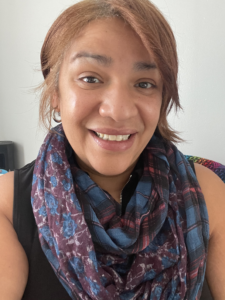 Rosa Fernandez
Rosa Fernandez Program Director
Health Equity Partnership of North Central MA (CHNA9)
Leominster, Massachusetts
Rosa has gone above and beyond in her work for rural communities throughout North Central Massachusetts. She has connected with people across the region, distributed thousands of free COVID-19 test kits to community members, and started several new programs. Rosa began a North Central MA chapter of the Massachusetts Women of Color Coalition. She convened a BIPOC Behavioral Health Provider Network in the region, which is working to build community among and resources for BIPOC behavioral health providers, including BIPOC students who hope to become clinicians. In addition, Rosa has played an integral role in maintaining the existing programs of the Health Equity Partnership, including significant engagement around the region’s Community Health Improvement Plan and the Anchor Collaborative, a regular convening of the region’s anchor institutions.
In my current role as Program Director of the Health Equity Partnership of North Central MA, I am responsible for leading and directing outreach efforts that specifically address issues that impact the health and wellness of the community. I identify, organize, and implement several programs and services that focus on our underserved, diverse rural populations.
I completed a Youth Civic Leadership program for youth in rural communities to develop leadership, civic engagement, and public speaking skills. I began the program by identifying and partnering with youth-serving organizations in the area (Luk Inc., Boys & Girls Club, YMCA, and Youth Venture). Our youth leaders were trained and facilitated an advocacy project, engaging them as citizen-leaders in a complex political and cultural environment and encouraging them to advocate on the issues most important to them. Multiple students from this program spoke to a large audience of local legislators and policymakers at the Health Equity Partnership’s annual legislative breakfast.
Improving, understanding, and promoting rural health care, and development of opportunities in our rural areas.
I am devoted to building a healthier community through education and community health improvement projects that bring change and build pride, dignity, cultural humility, and motivation in the communities we serve.
I enjoy working with our partners in our State Office of Rural Health. We have built trusted relationships, and they have given me and my colleague the tools and resources to do our best in the delivery of our work.
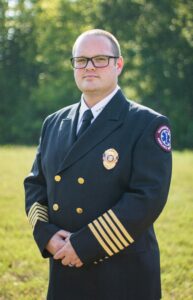 Justin P. Duncan, MSc, BS, NRP, CCEMT-P, FP-C
Justin P. Duncan, MSc, BS, NRP, CCEMT-P, FP-C CEO, Washington County Ambulance District
President, Missouri EMS Association
Co-Founder, Washington County MIH Network
Mineral Area, Missouri
I have a long history in EMS, serving as both a ground and air EMS Clinician. I have served as an EMS instructor, line-level supervisor, department manager, regional director, and now CEO. Given my history of dedication to health care and passion for education, my career naturally progressed into both education and leadership.
Good health is more than good medical care. My team and I are constantly looking for new ways to bring innovative therapies into the prehospital setting that meet the needs of the whole person. Through mobile integrated healthcare (MIH), we have improved patient health and wellness (medical, social and emotional), patient health outcomes, and access to resources. We have also reduced healthcare costs by more than 50% across the board.
The project I’m most passionate about is our MIH program. I’ve seen it personally change lives for the better. This work could not have been achieved without the team within my agency, my valued local and state-level partners, and, most importantly, the partner organizations that comprise the Washington County Mobile Integrated Healthcare Network. Collectively, we knew MIH was successful following the pandemic. We saw significant health improvement in the patients we were serving. Our success could be attributed to a willingness to explore different ways of doing business and investing the time, effort, and resources to make it happen. Involving local, state and federal stakeholders and policymakers early in the process was also a contributing factor.
Our MIH program initially began as a small pilot program focused on 21 diabetic patients and has now grown to include individuals with other chronic diseases, particularly heart disease. We also provide services for SUD/OUD and behavioral health patients and will implement maternal health in the coming months.
The “Power of Rural” is that we naturally work together or band together to resolve problems. We must be creative and innovative because we don’t have the same resources as metropolitan areas.
We could not have achieved the level of success for which we have been recognized without their early interest, support, and connections. They are active partners. They are involved in the conversation, provide feedback and look for resources to support our work. We view them as an integral part of our team.
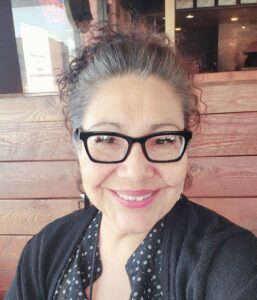 Stephanie Iron Shooter
Stephanie Iron Shooter Office of American Indian Health Director
Montana Department of Public Health & Human Services
Billings, Montana
Stephanie is a member of the Sicangu (Burnt Thigh) Oyate (People) from the Rosebud Sioux Tribe in Rosebud, South Dakota, and of the Aaniiih (Whiteclay) Anin (People) from the Fort Belknap Indian Community in Montana. Her career and life’s work have been focused on collaborating with Montana Tribes to address health disparities through the utilization of cultural strengths. Stephanie’s innate cultural value systems allow her to focus on building positive, progressive relationships for the common good of all people. Her early career centered around domestic violence and substance use prevention in Indian country. She sits on the state Native American domestic violence fatality review team. She also directed a grant at the Office of Public Instruction to implement a wraparound process in schools that served primarily American Indian students. Wraparound is a process that allows the youth voice to be elevated in the delivery of mental health services. She continues to make a difference in rural communities across the state. Her connections to rural run deep, and she brings a positive light and energy to everyone who works with her.
The Director of the Office of American Indian Health is responsible for identifying health disparities, developing health equity strategies, overseeing collaborative efforts between State, Tribal and local health agencies using data and local input, and providing a forum for addressing tribal-state health issues. Montana became one of the first states in the country to create a Director of American Indian Health position under an Executive Order of the Governor.
We have contracted with the Montana Office of Rural Health to create and disseminate training modules titled Caring for Indigenous Montanans. We are in the process of creating these modules and look forward to sharing them.
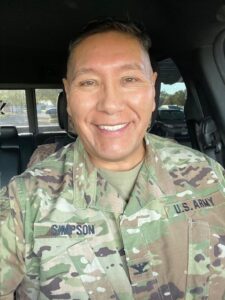 Loren Simpson, MD
Loren Simpson, MD Physician
South Lyon Medical Center
Yerington, Nevada
I am the Emergency Department Medical Director at South Lyon Medical Center (SLMC). Emergency, urgent care and sports medicine are my passions. I volunteer with youth athletic groups such as USA Boxing and provide medical coverage for rodeo events and mixed martial arts. When I am not working with SLMC, I am also on staff with our local tribal healthcare entities and am a Colonel in the Army Reserve. My military career has augmented my skill set practicing in rural Northern Nevada and vice versa.
SLMC provides crucial access to health care in rural Nevada. The hospital is a valuable community resource that has grown to accommodate the changing trends in modern medicine. Specifically, a new venture is in development as we battle addiction and the opioid crisis.
SLMC has successfully recruited and retained University of Nevada-trained physicians who are invested in the health care of our community. SLMC and its professional staff actively engage with and mentor University of Nevada student nurses, medical students, and residents to foster and recruit quality healthcare professionals.
SLMC benefits from its strong ties to the University of Nevada Medical School and Family Medicine residency program with specialty care in Women’s health and obstetrics, routinely scheduling patients at our facility. SLMC is currently in the early stages of developing a program to assist patients with opioid dependence.
“Power of Rural” embodies life in small-town Nevada. One learns to adapt, overcome, and adjust to living here. It’s a choice and is driven by culture, family and our history.
Growing up on a rural Indian reservation, my family had zero convenient access to health care without driving two hours to Schurz. That just could not be the standard of care. My entire career has been focused on improving health care for our rural communities.

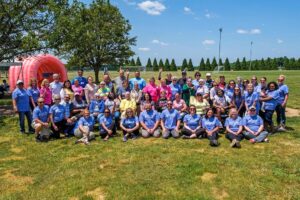 Inspira Health
Inspira Health (Donald Noblett, MPH, NCTTP, Cancer Grants Manager)
Mullica Hill, New Jersey
Cumberland County has been ranked the unhealthiest county in New Jersey for 12 of the last 13 years. Through education and preventative services, Inspira is helping improve the health of these communities – and the greater South Jersey region at large – by connecting individuals with the health care they need. We offer free cancer screenings across our counties through the NJCEED (New Jersey Cancer Education & Early Detection) Program and the ScreenNJ Lung Cancer Program, introduced a mobile mammography screening van with great success, and provide free tobacco cessation services and Nicotine Replacement Therapy. Inspira also advocated for the New Jersey Public Options Hospital Fee to be expanded to five additional counties to help ensure continued access to healthcare services for underserved and vulnerable patients. This will support our plan to expand Inspira’s Community Health Worker Program.
Through NJCEED, we’ve partnered with CompleteCare and Famcare to improve cancer screening rates among uninsured and underinsured community members. Our full-time outreach worker has elevated the success of these partnerships, adding a personal touch to the patient experience. Through a combination of patient navigation, provider education and patient incentives, we’ve been able to increase cancer screening completion rates.
We recently received funding to launch a Hospital-Based Violence Intervention Program designed to enhance the delivery of clinical and behavioral health services to victims of gun violence- and their immediate families- in Gloucester and Cumberland Counties. It reaches victims when they need it most – in the immediate aftermath of a violent incident – with crisis intervention, conflict mediation, victim compensation, mental health care, and substance use interventions so they can start their healing process.
We saw and heard firsthand the need for transportation services to help get individuals to free cancer screenings, preventative care, and treatment appointments. Through a series of funding, partnerships, and budget allocations internally, we’ve expanded our transport program to support physical access to care for patients. We’re thankful for the financial support of many organizations that have helped make accessible, affordable care possible.
The “Power of Rural” describes the innovative and collaborative work in rural communities to improve health outcomes. Innovative solutions are being implemented to help community members overcome barriers and promote health. The work being done in some of the most rural parts of New Jersey is being duplicated in less rural parts of the state, demonstrating how the “Power of Rural” can positively impact every New Jersey resident.
The New Jersey Office of Primary Care and Rural Health continues to be an incredible partner. The leadership, organization, and advocacy they offer have helped raise awareness about the availability of programs and services across the state.
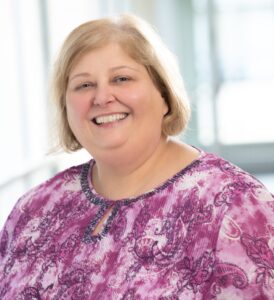 Mariah Hesse, MSN, RN, CENP
Mariah Hesse, MSN, RN, CENP Chief Nursing Officer
Sparrow Clinton Hospital
St. Johns, Michigan
Mariah Hesse, a lifelong rural resident, has not only made significant contributions to Sparrow Clinton Hospital (SCH) but has made significant contributions to Michigan’s rural health infrastructure through her role as President of the Michigan Critical Access Hospital Quality Network (MICAH QN), a position she has held since 2018. Mariah has grown the Network into a nationally recognized Quality Network, with Michigan being recognized by the Health Resources Services Administration (HRSA) as a Top 10 State for Quality Reporting and Performance since 2018.
I started 31 years ago as a Registered Nurse in Labor and Delivery at SCH, a small Critical Access Hospital (CAH) in rural Michigan. Today, my role as Chief Nursing Officer at SCH has allowed me to advocate for quality, safe patient care for CAHs across the state. During these 31 years, the community I have supported has also provided me with many growth opportunities
I have had the privilege to be part of the MiCAH QN for many years, with the last six years as the President. Being part of the network has allowed me to take part in strategic planning to continue demonstrating the value of rural hospitals and highlighting the quality of services provided in rural hospitals across the state. All 37 CAHs in Michigan voluntarily participate in quarterly meetings, share best practices and are transparent with quality outcomes to learn from each other. The outcomes and initiatives of the MiCAH QN have resulted in Michigan being recognized as a quality leader nationally. Within my own organization, we continue to build relationships and collaborate with community partners to address and impact social determinants of health.
SCH is the only CAH in Michigan to receive designation and re-designation for the ANCC (American Nurses Credentialing Center) Pathway to Excellence Program. This application and submission process took months to complete, which included collaboration with many disciplines outside of nursing, like community partners, pharmacy, and physicians, to name a few. Educating the nursing staff took innovation to promote understanding and engagement. Receiving notification that we were designated as a Pathway to Excellence Hospital by the ANCC was validation that we have built a positive working environment and have processes in place to impact outcomes in a positive way.
The “Power of Rural” means connecting people with resources to thrive in their communities. Networking and relationships are the keys to opening doors and building a solid foundation for the people and the community.
I have worked with the Michigan Center of Health (MCRH) for many years. My relationship with the MCRH is outstanding, and the support we receive is remarkable. Their support, access, and advocacy are overwhelming and difficult to put in writing.
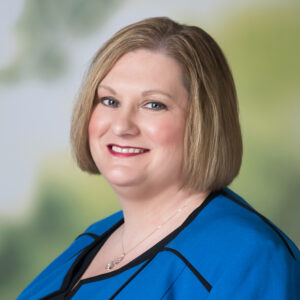
 Mercy Health-Marcum and Wallace Hospital
Mercy Health-Marcum and Wallace Hospital (Trena Stocker, Hospital President)
Irvine, Kentucky
Mercy Health Marcum & Wallace maximizes their resources to focus on contributing to their community and beyond in many ways. For example, through Project Hero, they met with groups of veterans in surrounding communities, offering resources and services often not afforded to veterans in rural areas. They also partnered with their local EMS to distribute AEDs and offer training on proper use throughout the county. This is only a small list of Mercy Health Marcum and Wallace’s many contributions towards their community; they go beyond being a health care provider/hospital and fulfill the mission of being a network of people who love and support the surrounding community.
Mercy Health- Marcum and Wallace Hospital is a 25-bed Critical Access Hospital in rural Eastern Kentucky. Our community-focused strategy expands through collaborations and educational workshops, empowering the community with knowledge and support beyond our hospital. We’re dedicated to making a true impact on our community’s health and well-being.
We continually strive to offer state-of-the-art technology to ensure patients receive top-of-the-line procedural testing. 3D Mammography was purchased through the assistance of a major fundraising campaign by the MWH Foundation and an Appalachian Regional Commission (ARC) grant. By offering 3D Mammography, we’ve identified many early-stage cancers.
The Kentucky Opioid Response Effort – Quick Response Team (QRT) comprises a collaborative, interdisciplinary partnership between local law enforcement and EMS. They conduct follow-ups after an individual overdoses and provide engagement and relationship-building to educate individuals, family members and the larger community about addiction, prevention, harm reduction, treatment and recovery, and how the QRT can assist. Thus far, in 2023, they received 82 referrals from dispatch and were able to make contact with over 40 individuals.
All CAHs and rural entities struggle with the same issues as other hospitals: rising cost of salaries, decreased reimbursement from payors, struggling economy and overall change in the healthcare landscape. Mercy Health-Marcum and Wallace has overcome these challenges in two ways: Friends and family caring for friends and family goes a long way to stem the higher turnover rates seen in an urban market and assist in higher quality of care. Additionally, truly knowing the communities we serve and understanding the healthcare needs allows the organization to offer services that will bring financial and health benefits to the community.
Rural healthcare in and of itself is Power. Taking care of someone in their community versus miles away allows that person to truly be served at their place of need. Rural healthcare is also very compassionate towards community services and needs, allowing providers and associates to work where they want to work in a positive situation.
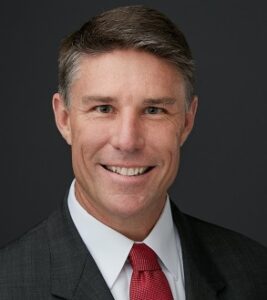 Genesis Medical Center, Aledo
Genesis Medical Center, Aledo (Ted Rogalski, Administrator)
Aledo, Illinois
This Critical Access Hospital has made the provision of mental health care in the communities it serves a top priority. They have worked closely with their community and the local health department to improve mental health and substance use treatment. Some highlights of their work include providing mental health counseling in the local schools, collaborating with the State’s Attorney’s Office to develop a drug court, and providing space for initial intake with clients at the hospital.
As the Administrator, I have had the pleasure of leading our 22-bed Critical Access Hospital and Rural Health Clinics since 2010. The hospital was a county-owned facility when I came to the organization. The first two years were focused on a financial turnaround, which was successful. We then completed an acquisition to create Genesis Medical Center, Aledo. We embarked on a $13M facility renovation and the implementation of a new EMR. The next several years focused on building the organization’s culture and improving our quality and safety performance.
As the sole healthcare provider in a very rural county (population of 16,000), providing as many local services as possible is critical, allowing easy access and eliminating the 30-mile travel to the next closest healthcare provider. We are the second largest employer in the community and have a significant economic impact, which is vital to maintaining a vibrant rural community. We have also had a lead role in creating an economic development organization that has been operating successfully over the past six years.
Mental health was the top priority in our Community Health Needs Assessment. In 2019, with the support of a HRSA Rural Outreach Grant, we partnered with the Mercer County Health Department (MCHD) to develop the Mercer County Mental Health Action Program. The goals were to improve access to mental health services and reduce barriers to care and delays in service. The hospital committed to employing a Psychiatric APRN and a behavioral health counselor, while MCHD provided a nurse navigator. Over the three-year period, 700 new, unique individuals received counseling services, 156 of whom were actively enrolled in case management. The program has been sustained post-grant and is active today. The hospital also leads a Mental Health Consortium, which brings together over a dozen community agencies to collaborate, support addressing social determinants of health and enhance our behavioral health services.
First, the “Power of Rural” is the overwhelming amount of collaboration and support that exists in our rural community. Second, our size allows us to truly know our patients and community. Not only does this provide us with a clinical benefit in delivering effective care, but it also supports our culture of friends and family caring for friends and family.
Our State Office of Rural Health has been critical in our ability to recruit and retain MDs and APPs in our Rural Health Clinic through their support of the State Loan Repayment Program. Recruiting providers to our rural community is very difficult, but this program has been instrumental in our effort to do so.
 Geer Village Senior Community
Geer Village Senior Community(Stacie Nicholas, Executive Director)
North Canaan, Connecticut
Geer’s Transportation Department provides most of the transportation to seniors and disabled individuals in the remote corner of northwest Connecticut. Transportation is provided free of charge and allows individuals to meet their healthcare and basic needs where public transportation does not exist.
Geer initiated an on-demand (Uber-style) transportation program in 2022. This program provides free transportation to anyone residing in the catchment area over the age of 60 or disabled. We collaborated heavily with other nonprofit organizations in the area to identify the need and design the program, specifically with other healthcare providers and especially with the behavioral health community. Within six months of starting the program, we served over 100 individuals, and within the first year, we provided as many rides in that program as we do in all the other transportation programs we provide. As we navigate into the second year of service, we are grateful to the private philanthropic community that has stepped up to provide a 50% match to the Department of Transportation to operate the program.
It has been challenging to meet the demand; we could increase service times and volume if funding were available. We balance the requests so that we can serve the most people in the time that we have.
It means collaborating for multiple impacts and achieving the greatest results with the resources available.
Moving to a beautiful rural area inspires me to stay and have an impact on rural health because I can be closer to nature in a smaller community and work closely with those our service directly impacts.
It was through our relationship with the Office of Rural Health that the funding to pilot this program became available. Once the pilot project proved successful, we could leverage that support to find permanent funding. Without the Office of Rural Health, this would never have happened.
 Well Fed Arkansas
Well Fed ArkansasJoshua Harris, Executive Director
Little Rock, Arkansas
Well Fed Arkansas truly embodies the essence of a Community Star through their remarkable work in transforming underserved rural areas. Their innovative model tackles food insecurity by directly reaching out to communities and providing access to healthy and nutritious food. What sets Well Fed Arkansas apart is its commitment to not just delivering food but also providing education. By creating an ecosystem where education and access to wholesome food intersect, they effectively address social determinants of health and uplift the communities they serve.
We work alongside local community partners to create long-term impact on diet-related illnesses and deficiencies. Our work in Jefferson and Phillips counties provides healthy food access to food desert areas. Participants have seen positive changes in their health and wellness because of consistent access to nutritious foods. Our programs also help build community relationships and positivity as participants learn and pick out food together at our host sites.
Together with the staff of the UAMS East clinic in Helena, we crafted and launched a Produce Prescription program for patients suffering from diet-related illnesses. While most Produce Prescription programs focus on temporary food assistance through a gift card to a retailer, we chose to innovate a market-based program whereby patients could “shop” for healthy foods onsite at their monthly wellness checkup. Well Fed oversees this novel program by focusing on the diet intervention we provide onsite at the clinic. Patients can pick out their groceries according to their dietary needs, along with our nutrition coaching. We have seen weight loss, A1C improvement, and BMI changes. Our success has been our strategic partnership and intentional approach with each patient.
We have been working towards more true diet intervention approaches to food insecurity. We see a high need for nutrition intervention beyond the need for food. Arkansas has high rates of obesity, diabetes, and cardiovascular issues among low-income communities. This health disparity has prompted us to work with healthcare professionals to develop programs strategically addressing diet intervention.
We encountered challenges in educating participants in our program as we didn’t have the expertise or the budget to provide professional nutrition coaching. We found out there are SNAP-Ed programs through the University of Arkansas Cooperative Extension and were able to form a perfect partnership.
The Power of Rural means acknowledging the potential of rural communities to make a big impact on their state. Much of rural Arkansas works hard to grow and provide industry for the rest of the state while being overlooked in public services. If we can work together to better equip our rural communities with health and opportunity, our state would be more poised to excel across the board.
 Woodlawn Health
Woodlawn Health (Paula McKinney, DNP, RN, NE-BC, Vice President of Patient Care Service & Chief Nursing Officer)
Rochester, Indiana
Because Woodlawn Health is putting patients before dollars, they have been selected as Indiana’s Community Star. Woodlawn’s “Maternity Oasis” campaign came from the desire to find a strategy to keep the Woodlawn Birthing Center from becoming another statistic…a community hospital without Obstetrical services.
It is not uncommon for Woodlawn medical providers to have the privilege of simultaneously caring for multiple generations of the same family. Depending on the provider, they may have also attended the births of multiple generations. This an example of rural care at its finest, building a trusting relationship that lasts a lifetime.
Without Woodlawn, many families would have to drive for care, and that drive would most likely deter those seeking care or not allow them to get there promptly. It is one of the many reasons Woodlawn has chosen to invest in its OB department while other rural hospitals are closing their units, giving expecting moms a place to deliver close to home!
Due to Medicaid reimbursement and the Hospital Assessment Fee (HAF) that hospitals must pay in Indiana, Woodlawn still loses two million dollars annually on its OB department. We’ve teamed up with the Indiana Hospital Association (IHA) to voice concerns about rural health care, especially OB services. Our CEO, Alan Fisher, worked with the IHA to speak with legislators and testified in Indianapolis about reducing HAF payments and increasing Medicaid. Hopefully, some reform will allow rural health systems to thrive and prevent maternity deserts in Indiana.
In 2022, Woodlawn was only delivering 12 babies a month and losing millions of dollars each year, which was not sustainable to keep our doors open. We made a commitment to our community to become a “Maternity Oasis.”
In the spring of 2023, St. Joseph in Plymouth, Indiana (25 miles to the south) stopped doing OB services and contacted Woodlawn to do emergency cases. Knowing the announcement would significantly impact many expecting moms in the adjacent county, the team sprang into action to help those affected. The marketing and OB teams collaborated to offer tours of their facility and disseminated information through social media, local newspapers, and the radio so expecting moms knew they had options. Due to the team’s efforts, we’ve seen deliveries increase to 22 in just one month, and we’ve attracted two new providers to help us care for expecting mothers. We know our emphasis on maternal care will impact families and our community for years to come by giving expecting mothers a place for care that is close to home.
There is power in caring for friends and neighbors in your community. In rural communities, many times, those relationships build over time. Our team and medical providers become trusted friends to so many. It is common for community members to remember the nurse or doctor who cared for them or their family members. They often see those caregivers at the grocery store or a school event. For many, our health system has cared for their family for generations, which is an amazing honor we do not take lightly.
 Adelaide “Addie” Eckardt, MS, PMHCNS-BC, DON
Adelaide “Addie” Eckardt, MS, PMHCNS-BC, DON Director of Nursing
Eastern Shore Hospital Center
Cambridge, Maryland
Maryland’s 2023 Community Star was selected based on her dedication and activity on behalf of rural Maryland over the past year (and decades!). She has demonstrated her support for rural health in Maryland in person and virtually at every turn. Throughout her tenure as a Maryland State Delegate and Senator, “Addie” kept a keen eye and busy legislative hands involved in rural health and nursing. Despite busy schedules and state-level contributions, she served as a long-time regional Area Health Education Board member. During the past year, she transitioned from a 28-year legislative career into public health service as a behavioral health nursing director in rural Maryland. Addie’s presence as a stalwart supporter and connector in rural Maryland is well deserving of recognition.
I am the Director of Nursing in an 82-bed State Psychiatric Forensic Inpatient Facility in Rural Maryland. I have a long-standing history of working in this facility and also serving 28 years in the Maryland General Assembly advocating for services and funding for individuals and families struggling with severe mental illness and substance use and abuse.
Through the years, I have promoted and advocated for services and funding for mental illness/brain disease. I have introduced and passed many bills to assist with the delivery system in Maryland. As a retired Senator, I now work in the hospital setting, experiencing the system changes from legislation I have worked on and passed.
Passing legislation for those incarcerated for crimes committed but need inpatient evaluation and treatment to determine competency to stand trial and get on with their lives.
Covid has severely impacted the nursing workforce. Hiring skilled licensed and unlicensed nursing staff has been challenging, and expensive travelers have been utilized to fill the void. I plan to build a workplace in which staff want to work and advance their nursing careers. We will grow our own, so to speak.
Recognizing the need for health care for everyone that is affordable, accessible, and of quality.
The Office of Rural Health has been most helpful by bringing resources to the table to facilitate the rural delivery system and building the workforce. They work through various population groups and organizations like the Area Health Education Centers and the Maryland Community Health Resources Commission. Facilitating funding for workforce needs is an example of their commitment to rural needs, and their advocacy at the Federal level is critical.
 Peggy Gautreau, RN, BSN, CNM
Peggy Gautreau, RN, BSN, CNMAdministrator
Total Family Medical
Robert, Louisiana
We opened our doors ten years ago to provide care for those with the most difficulty accessing health care. Our mission was and still is to provide full-scope health care with the goal of Dignity. Compassion. Respect. Every patient. Every time. No matter what.
Since opening Total Family Medicine, I have wanted to offer mammograms to our patients and community. I had seen a larger neighboring hospital system’s mammogram bus drive from city to city and wished we could bring that to our community. Initially, our volume was not high enough, but I would reach out to them year after year. They finally said yes as a “trial” and gave us two dates for their mammogram bus to come on-site for the year. If we could “fill up the schedule,” they would consider us. I am happy to say that we are in year three now with five yearly dates to offer mammograms!
In 2016, a horrific flood devastated our area, and we lost everything. We began seeing patients in the parking lot while figuring out our next steps. A local dentist loaned us her former dental trailer, where we saw patients while trying to rebuild a new clinic. Our State Office of Rural Health reached out to Americares, whom we had not heard of at the time. Two women from the organization flew down to help those affected by the flood. They just happened to come to my clinic (well, parking lot at the time) the day I got the call that the modular building I thought I secured wouldn’t happen unless I came up with substantially more cash to purchase the unit outright. As they toured the soaking wet clinic with watermarks 8 feet high and boxes of gloves, band-aids, etc. still floating on the floors, they overheard my frantic calls and maneuvering what we would do next. That evening, they presented me with a check from Americares for the balance on the building that I did not have. Six weeks to the day of the flood and losing everything, we were re-opened and seeing patients in our new clinic.
In one word, it means “everything” to us. Rural health care has ALWAYS been my love and passion. It helps provide care to those most in need. The “Power of Rural” makes me feel like there is a much larger force and many more people who truly share the same mission and goals. Together as one force, we are far more powerful than alone!
I always say that without our State Office of Rural Health (SORH), I would never have been able to open my doors, and I would not still be open without them! The SORH encouraged and supported me, walking me step by step through opening a Rural Health Clinic. They provide educational opportunities, networking, collaborating programs with other organizations, and so much more! Without them, we would not be where we are today and would not have been able to care for the thousands of patients over the last ten years.
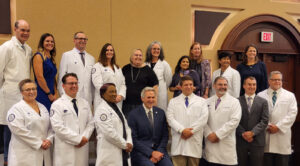 Kansas State University PA Program
Kansas State University PA Program (Gwen Ferdinand-Jacob, Physician Assistant Program Director)
Manhattan, Kansas
The Kansas State University (KSU) Physician Assistant (PA) Program was selected for its commitment to public health and the recruitment and retention of healthcare providers in rural communities.
In April of 2022, the Clinical Director of KSU’s PA program contacted the Kansas Office of Primary Care and Rural Health, housed within the Kansas Department of Health and Environment (KDHE), proposing an internship partnership between KSU and KDHE. This partnership would help new providers better understand the role of public health and bridge the learning gap in healthcare providers’ education. The student would spend time with multiple bureaus and divisions across KDHE as one of their clinical rotation electives. KDHE hosted the first PA intern in the spring of 2023. The intern spent one to three days with ten different offices within KDHE, took part in a legislative rotation to learn about the state legislative process, visited outside stakeholders, toured an FQHC, participated in site visits, and observed oral screenings performed at area elementary schools. The student later gave a presentation to his entire PA class, highlighting his experience. This one-of-a-kind collaboration would never have come to fruition without the foresight and engagement of the leadership at the KSU PA program.
The KSU PA program’s mission statement states, “…The program is dedicated to graduating physician assistants who demonstrate professionalism, are globally minded, and practice within an ethical framework to improve the quality of life of their communities and the medically underserved populations.” At least 50% of our students are residents of Kansas, most of whom are from rural areas. Students complete clinical rotations in rural Kansas. We hope this introduction to rural health will inform their final decisions regarding practice location upon program completion.
A dream and a blank piece of paper led to the development of a PA program at K-State that enrolled 35 students three and a half years later. From selecting a suitable space for the program to choosing courses that best support the PA’s future in rural health, this program would be non-existent without collaboration on multiple levels. Our search for qualified faculty resulted in 221 years of clinical practice experience. We worked with various healthcare systems, clinics, and processes to ensure our success. Our diverse student cohorts mark our success.
One of our clinical phase students recently completed the first five-week rotation with KDHE. The student benefited greatly from this experience, which helped him understand the public health role in society, preparing him for future collaboration and understanding the responsibilities of each office of KDHE. Our PA program is thankful for the opportunity to learn so much about this rotation that I am sure will become a popular elective.
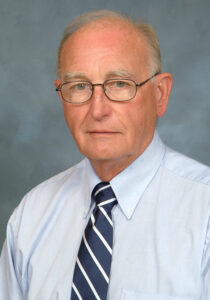 William “Bill” Coleman, MD, PhD (late)
William “Bill” Coleman, MD, PhD (late)Director, Office for Family Health Education & Research
UAB Heersink School of Medicine, Huntsville Regional Medical Campus
Huntsville, Alabama
Dr. Coleman was born and raised in a rural Alabama community (Jemison, pop. 1,000 at the time) and practiced family medicine in Scottsboro, Alabama, for 25 years (population 15,000). He lived for 83 years and never called anyplace but Alabama home. He became highly educated, with an MD and PhD; traveled the world pursuing his anatomy PhD research; became national president of the American Academy of Family Physicians; and served on advisory committees for the White House and Harvard University. But what Dr. Coleman was most personally proud of was when a medical school dean pronounced Dr. Coleman as a true “servant leader.” To Dr. Coleman, that meant his first and foremost desire as a physician was to serve his patients and his community. In a rural community, he recognized that it was the nature of his profession to support the community in any way he could, just as he relied on the community to support him as the village that helped raise his children and supported his family.
Dr. Coleman established the Office for Family Health Education & Research (OFHER) at the UAB Heersink School of Medicine. The office supports rural medicine efforts with two main projects:
A successful and collaborative project OFHER performs annually is the administration of the Alabama Rural Medical Service Award (ARMSA) in conjunction with the Alabama Department of Public Health’s Office of Primary Care and Rural Health. ARMSA exists to place primary care physicians and family medicine nurse practitioners in medically underserved areas of the state through financial incentives in the form of service loans. This project and collaboration were successful, as fourteen physicians and nurse practitioners were awarded $640,000 to practice in medically underserved areas in FY 2023.
A primary challenge in the early years was sustained funding. Dr. Coleman specifically overcame this challenge through proactive and relentless efforts to educate local and state officials across Alabama on the importance of expanded advocacy and pro-rural health policies justified through office data. Dr. Coleman did an excellent job of establishing the novel concept of capturing primary care access via the primary care service area (PCSA) model and explaining its purpose and intrinsic worth for placing physicians in rural Alabama. Due to these extensive efforts over many years, OFHER is fully funded through the Alabama Educational Trust Fund.
 Terry Scoggin
Terry Scoggin Chief Executive Officer
Titus Regional Medical Center (TRMC)
Mount Pleasant, Texas
Terry has a strong ability to lead with both his head and heart. When he moved into the CEO role at TRMC seven years ago, there were only a handful of aligned physicians, average clinical performance, and a less-than-optimal financial picture. The support within the community was lacking and diminishing. His empathy and compassion for the people he serves, coupled with his phenomenal capabilities to think strategically and assemble a strong Executive Team, have allowed this health system to stabilize, grow, and achieve.
The nature of my work in rural health is to ensure that rural has a “seat” at the table – telling the “story of rural” and ensuring this wonderful way of life is not forgotten. My role also includes being a catalyst with my peers in rural by driving innovation and transforming rural health care to reduce the gap in mortality between urban and rural. We should not live shorter lives based on our decision to raise our families in a rural setting!
Named one of the Top 250 Maternal Hospitals in the U.S. in 2022, TRMC delivers approximately 950 babies annually and is a Level II Designated Maternal Hospital and Level II Designated NICU. TRMC partnered with the Texas Organization of Rural & Community Hospitals and the Texas Hospital Association to add a rider in the 2023 Texas Legislature to create a state pilot for Tele-Psychiatry in Rural Emergency Departments.
One of the biggest challenges in our community is the lack of public health. Titus County is one of the twenty-six counties in our region that does not have an independent health department. Realizing the importance of public health post-COVID, TRMC took the lead by creating the Center for Healthy Living. This department is building relationships with local employers, community organizations, neighborhoods, churches, etc., to ensure community needs are met.
The “Power of Rural” is PERSONAL! You know the people you are helping, assisting, and advocating. You know their faces, their struggles, their pain, and their success. The personal touch also drives you to do better, go farther and make sure you meet the needs of your patients and family members.
My family adopted Mount Pleasant as our home, and we have been graciously accepted by this community. An opportunity became available at the hospital, and I was hired to be Chief Financial Officer. I have worked in many industries over the past thirty years, but health care (especially rural health care) is totally different. The ability to serve, give, treat, and love people when they need you most is the part of this industry that drives me every day.
The State Office of Rural Health has been instrumental to our community and health system. During COVID, they participated in providing information and resources to the independent rural health systems, which was critical.
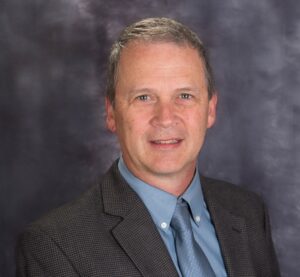 Pete Antonson
Pete Antonson CFO
Northwood Deaconess Health Center
Northwood, North Dakota
Pete Antonson’s entire career has been dedicated to improving rural health in North Dakota. He began working at Northwood Deaconess Health Center (NDHC) in 1983 and slowly moved up the ranks, serving as CFO and, eventually, CEO, a position he held for 22 years until he retired in 2022. During his tenure, Antonson made significant contributions to improving long-term care in North Dakota.
We truly understand and do what we can to always put the client first. As a non-profit, we don’t always choose the bottom line as the only decision criteria. In a small town, you are always linked to your community, which leadership within the organization has always understood to mean you are involved in the community. Whether that is serving on boards or committees or volunteering in other ways, we strive to engage and participate in our community. As the largest employer in Northwood, we make an economic impact over and above community engagement. Our staff live, work, have children in school, and turn over the dollars we receive for work in the community.
Early during the pandemic, the local public school approached us, asking if we could provide a school nurse for the calendar year. We specifically recruited someone we felt could meet the needs, as we had no nurses to spare, and the results were fantastic. I believe the Northwood Public School was the first school in rural Grand Forks County to have a school nurse, leading other schools to follow suit. Now, with the school seeing the continued need for a school nurse, they have hired their own.
Rural health is under a lot of strain and pressure. We have a situation that we believe is the best of both worlds. We are an independent organization; however, we leverage a management agreement with a tertiary organization to maximize resources and purchasing power. It has also been important to create a culture where voices are heard and opinions can be shared freely without judgment.
Many minds make for great thought and discussion. If we harness the energy, brain power, and spirit of our people, we can be far more nimble, move quickly, and be less burdened by the bureaucracy of larger organizations.
It started as my one and only job offer that blossomed into more. I found that working in my hometown could help make a difference in the health of people and families I grew up with. Small towns are a great place to raise a family. Small towns are the spirit and vibrancy of our state and country.
 Susan Trippet, ARNP-CNP
Susan Trippet, ARNP-CNP Employee Education Provider
Beaver County Hospital Authority
Beaver, Oklahoma
Beaver County Hospital Authority is a very rural setting in the Oklahoma Panhandle. We are a Critical Access Hospital and serve the county with two rural health clinics. My role is in a broad scope of education with a primary focus on providing staff with educational opportunities. We have never had the opportunity to have someone solely dedicated to education before now. One aspect of my job that has been the most exciting is helping implement quality improvement projects. Our rural health clinics have seen improvement in patient outcomes as a result of these projects, and we look forward to improved patient outcomes in other departments as we continue to develop our quality improvement teams.
After retiring from being a family nurse practitioner and leaving a practice that I loved, I never considered that I could continue to try to be a difference-maker in my community’s health. I saw things I wanted to change when I was in clinical practice but never had the time to focus on the health issues that were barriers for our patients. Now, I can work with other people in our organization and surrounding areas to help remove these barriers and provide better access to health care for our community.
One successful project is the improvement of quality care at our rural health clinics. We had always worked on quality improvement projects but felt like we were alone on an island trying to navigate our findings. After we started working with the OSU Center for Rural Health and with Lilypad using their PDSA model, we saw outcomes and made changes during our projects to improve quality.
One of the biggest challenges that our organization has encountered is the lack of physician providers. As all recruiting efforts seemed to dry up, our organization brought on additional nurse practitioners to serve our communities. The mid-level provider in the rural setting is invaluable to our organization.
The “Power of Rural” means that there is a force behind being rural. The people who are “grown” in the rural area are some of the most resilient, resourceful people who know how to tap into the strengths of each other to make something work. I would never underestimate rural when faced with a challenge.
When I thought about becoming a nurse, I went to work at our small-town hospital to see if I would like it. I fell in love with it! When everyone else in nursing school was picking a specialty to go to on graduating, I kept thinking that I wished there was a rural nurse specialty to choose from because that was what I wanted to be. I love taking care of patients that I have known my whole life. And I love meeting new people who are leery about what to expect with rural health and convincing them they are in great hands with us.
Our State Office of Rural Health is one of the best benefits that we have. The information that they give you in webinars and emails and the networking that they provide is something I would not want to do without. I look forward to continuing to work and learn from them to help better the health of our community.
 Raymond Hino
Raymond Hino Chief Executive Officer
Southern Coos Hospital & Health Center
Bandon, Oregon
For over 42 years, Ray has embodied the “Power of Rural” as an individual and in his leadership roles at rural hospitals. He entered his current role during a challenging time – amid the pandemic and hospital leadership challenges. He has taken the time to make meaningful connections in the community and has built a strong and positive culture at Southern Coos.
I am the CEO of Southern Coos Hospital & Health Center (SCHHC), a 21-bed Critical Access Hospital on the Southern Oregon coast. We make a difference in our community by providing excellent quality inpatient and outpatient services so our patients can be treated locally without traveling hours away from families and friends.
In 2021, as schools were reopening after the pandemic, a need was identified for a school nurse to provide for the health and safety of returning students. Our hospital and the Bandon School District developed a collaborative partnership to provide a school nurse program. The program just completed its second year and has been a huge success.
When I arrived at SCHHC, I was the seventh CEO hired in the last ten years. Due to constant turnover, there was no clear path to making necessary improvements and restoring public confidence in our hospital. We pledged that a new Strategic Plan would be created in my first 90 days on the job, and we accomplished that. The Plan is not a binder that sits on a shelf; It is a living, breathing tool that we visit frequently. Since implementation, we have achieved DNV accreditation for the first time. We have become a partner and trusted healthcare resource to area businesses, created new collaborations with other healthcare providers, and developed a financial sustainability strategy. In less than a year, we achieved over 70% of the goals we established in our plan, and our hospital has enhanced its reputation and standing.
Our primary care clinic has three Doctors of Osteopathic Medicine (DOs) who are highly skilled in osteopathic manipulative therapy (OMT). We receive referrals from hundreds of miles away for this specialty.
The “Power of Rural” is the people who live, work, and enjoy recreation in our rural communities. In healthcare, we have the privilege of caring for our friends, neighbors, and their families. Our patients are not numbers or strangers. Our healthcare team is not here to accumulate great wealth or to try to impress anyone. They are here because this is where they are needed.
Our State Office of Rural Health has been a tremendous ally to our hospital in our mission to take care of our patients and community. For example, they have helped us create a Quality Improvement program and have given me the opportunity to meet with elected representatives, helping elevate our needs for funding and healthcare reforms. They are an invaluable partner.
 Angel Flight East
Angel Flight East (Jessica Ames, Outreach & Events Director)
Blue Bell, Pennsylvania
The mission of Angel Flight East (AFE) is to provide free flights for children and adults in need of medical treatment far from home. Serving rural areas across a 14-state footprint, AFE provides an option for residents to access the best care possible for their condition. Volunteer pilots use their own airplanes and cover all costs of the flight. Passengers can fly as often as needed, and there is never a charge.
At the peak of the COVID-19 pandemic, AFE had to suspend passenger flights briefly. A volunteer pilot in Ohio asked if our organization could fly personal protective equipment (PPE) from Indiana to the Boston Emergency Management Agency. From there, we partnered with local volunteer groups and businesses who started making face shields, face masks, hand sanitizer, surgical gowns, gloves, etc. We donated all supplies to rural hospitals across the East Coast and flew 200,000 pieces of PPE to 90 rural healthcare facilities.
Along with flights to medical care, AFE also provides compassion flights for family members and friends to see a loved one in treatment. We have also flown children to specialty summer camps and partnered with other nonprofit organizations to help patients fly to medical conferences they may otherwise not have been able to attend.
The biggest challenge we face is a lack of knowledge about our organization. As a small staff, it is challenging for us to be in every state we cover all the time. Partnerships with rural hospitals and State Offices of Rural Health are valuable in helping us continue to spread the word about our mission to the people who may need it the most.
The “Power of Rural” means coming together with others who are passionate about rural health to really make a difference. Although one person does have the power to make a difference, it is almost always a bigger movement with more involved.
When we first started the Rural & Rare Outreach Initiative, we partnered with the Pennsylvania Office of Rural Health to learn where our efforts could be most utilized and have the biggest impact. The whole staff has always been incredibly generous with their time and expertise, as well as being a cheerleader for AFE. We continue to be extremely grateful for their guidance.
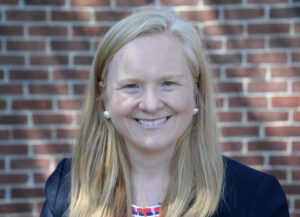 Meals On Wheels Of Rhode Island
Meals On Wheels Of Rhode Island (Meghan Grady, Executive Director)
Providence, Rhode Island
The mission of Meals on Wheels of Rhode Island is to meet the nutritional and social needs of those we serve so that they can maintain safe and independent lifestyles. Since 1969, our programs have worked to reduce food insecurity and social isolation amongst homebound older adults and other at-risk Rhode Island residents. In 2022, our Home-Delivered Meal Program served 3,084 homebound Rhode Island residents, 91% of whom were at least 65 years old. This program provides daily (weekday) delivery of a full and complete meal to the homes of individuals who cannot safely leave home on their own and, as a result, have difficulty accessing adequate nutrition. Each meal served (more than 357,000 in 2022) represents a time when a client also received a wellness check and social visit. As a result of our program, clients report better health, increased feelings of being safe in their own homes, and reduced isolation and loneliness.
We have long known that Block Island’s homebound residents need our help to live healthily, safely, and independently in their own homes. In our 54-year history, until this year, we did not have a partnership or delivery mechanism in place to provide services to Block Island residents. In 2023, we worked with the Town of New Shoreham Director of Human Services to develop a mechanism that now provides the program to Block Island! Utilizing ferry service, meals are delivered to the island weekly, stored in a safe and secure location, and delivered by volunteers on the island.
In addition to providing access to adequate nutrition, our programs offer increased safety assurances through daily well-being checks and social visits that reduce isolation and loneliness among our client populations. Supplemental initiatives, such as the Pet Food Program and Senior Wish Program, further work to reduce isolation and promote improved mental well-being for our clients. We will implement pilot programming to increase our statewide impact, including expanding our service model to provide nutritional and other services to additional populations. Through a partnership with Point 32 Health & Women & Infants Hospital, we are also serving pregnant and post-partum women.
The “Power of Rural” means working to provide necessary programs and services to all Rhode Island residents across all geographic areas. It is the power of our state’s healthcare partners to address the unique needs of our rural residents and to collaborate as stakeholders in bettering the lives of all Rhode Islanders.
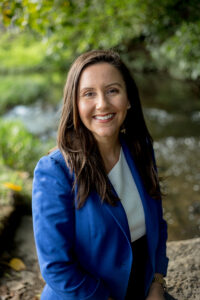 Jacy Warrell, MPA
Jacy Warrell, MPA
Chief Executive Officer
Rural Health Association of Tennessee
Decaturville, Tennessee
Jacy leads the Rural Health Association of Tennessee (RHA), a member organization with more than 700 members statewide. Jacy has transformed the organization by bringing new initiatives that inform policy development while delivering high-quality programs. Under Jacy’s leadership, a renewed focus has been placed on listening to rural health advocates and facilitating opportunities to expand and enhance their efforts locally. The association is leading healthcare apprenticeship programs for entry-level healthcare professionals, enrolling individuals into Medicaid and ACA insurance plans, and hosting events aimed at cross-sector peer-to-peer learning.
When I started in this role in 2020, I quickly learned that Tennessee has many Rural Health Clinics (RHC) that do not have a support network for advocacy, technical assistance, and communication with state agencies. Understanding how important primary care is to rural health, I began connecting with clinic administrators, state agencies and managed care organizations to learn more about these clinics. Through a FORHP Network Planning Grant, RHA staff and an Advisory Committee of RHC representatives developed surveys, conducted site visits, and formally launched an independent RHC Network. The Network has been awarded a Network Implementation grant to expand further and facilitate opportunities for RHCs to integrate into Tennessee’s larger system of care. Through these efforts, RHCs are gaining attention and recognition for their part in providing access to quality care in rural Tennessee.
Through a partnership with Amerigroup, RHA is integrating the training of rural doulas and Certified Lactation Consultants into its Workforce Development Program. In 2023, RHA facilitated the opportunity for an RHA Board Member to testify to the State Senate in an effort to recognize doulas as important advocates for pregnant women.
In 2020, we faced the possibility of a significant funding deficit because of the reliance on annual conference income. In response, we leaned into connecting with our most valuable resource – our members – and found opportunities to bring people together in the community to address access to care, workforce, and substance use disorder. This has led to strengthened relationships and more opportunities, not just for RHA but for the members who benefit directly from the various programs.
The “Power of Rural” is about relationships, being innovative, and a willingness to work hard for the communities we love.
RHA has had a relationship with the Office of Rural Health since the organization’s inception nearly 30 years ago. We strive to be a connector between rural communities and the office and work to keep them informed on issues relevant to communities across the state. Our recent successes and grant programs have allowed us to provide more and better information, leading to better-informed decision-making for rural communities at the state level.
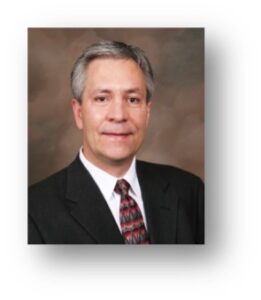 Greg Rosenvall
Greg Rosenvall Rural Hospital Improvement Director
Utah Hospital Association
Gunnison, Utah
Utah’s 2023 Community Star was selected in recognition of his many contributions to improving the quality of and access to health care in rural Utah.
I served as CEO of Gunnison Valley Hospital, a small Critical Access Hospital in Central Utah, for 15 years. Then, I joined the Utah Hospital Association as the Rural Hospital Director in 2011. In this capacity, I work with all rural hospitals in Utah to assist with operational efficiency improvement. The primary focus is on the nine rural independent hospitals because these hospitals are not part of a larger system or corporation; hence, resources are limited.
We organized the nine rural independent hospitals in Utah into an official business entity called the Rural 9 Network. Members pay dues, and I serve as Network Director. I help these hospitals collaborate to reduce isolation and use economies of scale to improve operational efficiencies.
We put the group purchasing organization (GPO) services of the Rural 9 Network hospitals out to bid and were able to realize a significant reduction in GPO service costs for all the hospitals. The negotiation also resulted in book-of-business share back revenue to the Network.
It is a challenge to navigate the independence of the Rural 9 Network hospitals and embark on collaborative projects that are truly meaningful. Once a few projects prove beneficial to the group, it builds momentum!
Rural voices really can be heard at the state and federal legislative levels when there is a unified voice. Many legislators are sympathetic to rural and the unique challenges and want to help.

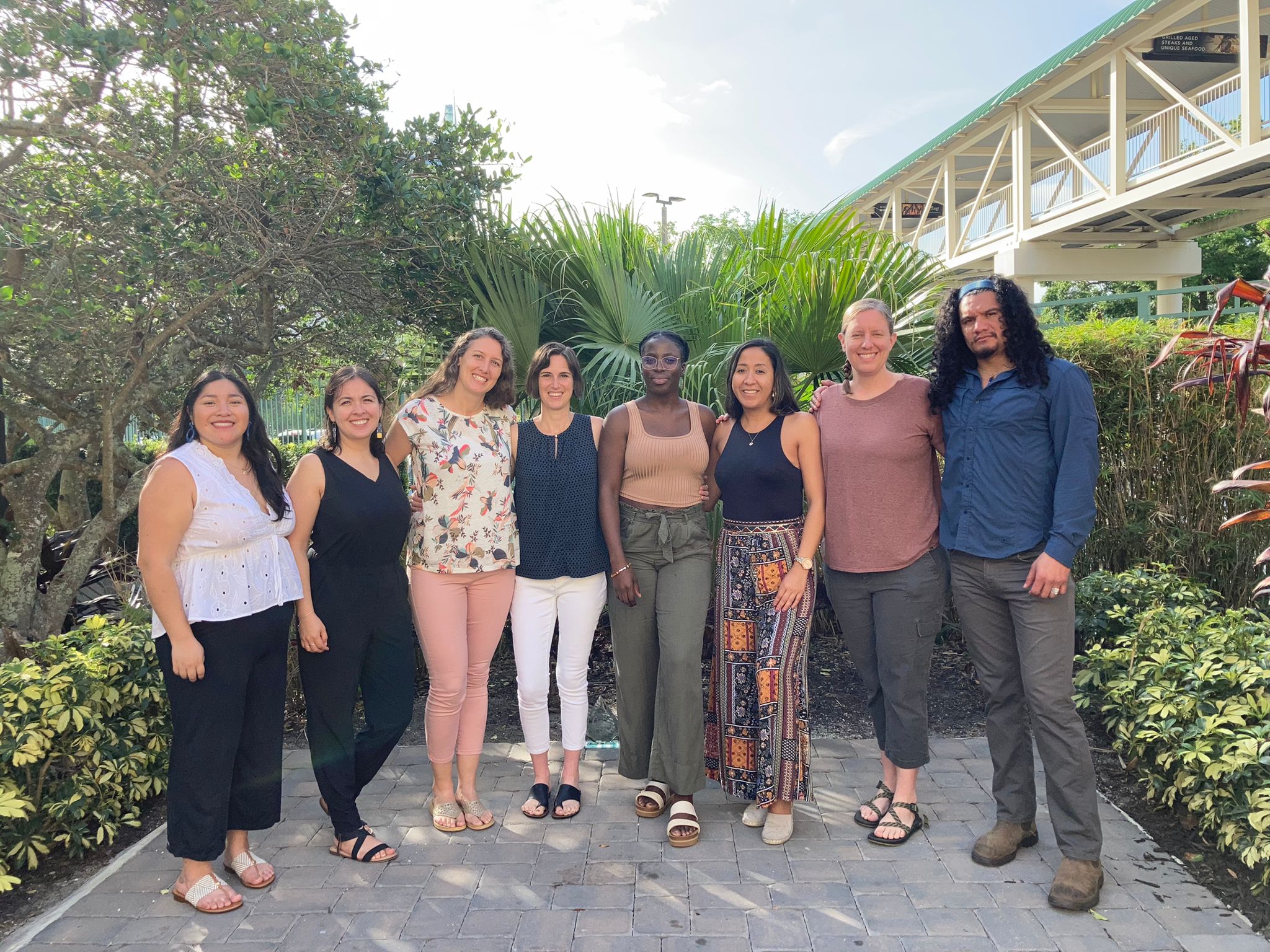 Naomi Wolcott-MacCausland
Naomi Wolcott-MacCausland Migrant Health Programs Lead
University of Vermont Extension
St. Albans, Vermont
Migrant Health Programs began as a health outreach initiative and kitchen garden project in the rural Vermont county where I grew up. Over the years, with the support of many community partners and varied funding sources, I expanded the scope and reach in response to identified community needs across our predominately rural state.
A small but mighty team of Community Health Workers, support staff and student interns work diligently to address the significant systemic and individual barriers to health faced by agricultural and non-agricultural migrant and immigrant workers and their family members. Our team improves the quality of life at an individual, household and population level by serving as liaisons, cultural brokers, health educators, advocates, patient navigators and interpreters between individuals, community-based organizations, and state programs to promote health, reduce disparities, and improve service delivery.
We coordinate home, farm, and community-based health and immunization clinics in collaboration with local health departments, health provider volunteers and family medicine residents. In addition, we have partnerships in place to distribute free food boxes and support households in growing culturally familiar foods in home gardens.
Access to Spanish-speaking clinicians is challenging in a state with limited linguistic diversity, particularly in rural areas. For the past three years, we have used grant funds to buy out two hours a week of a Spanish-speaking clinician’s time to provide tele-mental health services to agricultural workers.
After graduating from college, I lived in Central America for several years, visiting communities with significant outmigration of working-age adults. I witnessed the physical and mental health tolls of family separations and the sacrifices being made in hopes of creating a better and safer life for the next generations. Upon returning to the small dairy farm where I grew up in rural Vermont, I began doing outreach with the Migrant Education Program and coordinated a pilot project focused on labor management and communication on dairy farms with Spanish-speaking employees. After the first year, I coded all my calls from farm workers and owners, discovering that over 50% were requests for assistance navigating the healthcare system. In this data, I saw an unmet community need that I was uniquely positioned to address. Thirteen years and thirteen more counties later, I am more convinced than ever that our boots-on-the-ground approach is the key to achieving health equity within migrant and immigrant communities.
While ruralness adds a layer of complexity to the already significant barriers to care for migrant and immigrant populations, a small state comprised of hundreds of small caring communities creates opportunities for relationship-building and collaborations that would be out of reach in urban areas. Social capital abounds in rural communities, and that capital can be harnessed for positive change.
 United Way of Southwest Virginia
United Way of Southwest Virginia (Mary Anne Holbrook, Vice President of Community Impact)
Abingdon, Virginia
United Way of Southwest Virginia (UWSV) serves a large portion of the Commonwealth’s rural population, providing health, education, and financial resources to people of all ages. Communities across Southwest Virginia depend on them to quickly mobilize to meet immediate needs and assist in long-term recovery after disaster strikes. Their staff truly understand the needs of the communities they serve and are committed to their success. Their passion is matched with an unwavering dedication that results in meaningful work and programming for Southwest Virginians.
With a footprint that covers nearly 20% of the state, UWSV is the leading regional non-profit organization focused on community impact. Through an initiative-based cradle-to-career approach, we create sustainable solutions to address the challenges facing tomorrow’s workforce. UWSV innovates for positive, lasting social change through collaboration with government, businesses, nonprofits and individuals.
Known as an innovator and convener, UWSV annually produces a Rural Summit in partnership with the Virginia State Office of Rural Health. This event brings together hundreds of leaders and practitioners from all corners of rural Virginia to share best practices and align goals for greater impact.
For the 2021 and 2022 floods that devastated rural communities, UWSV stepped forward to coordinate long-term recovery efforts by bringing together donors to support the cause, developing a strategic plan, convening community stakeholders, and coordinating efforts to repair and rebuild to stretch donor dollars as far as possible. The organization has collaborated with countless organizations and individuals who have helped contribute to the repair and rebuilding of these rural communities.
The “Power of Rural” translates in our work to “Rural does not mean less.” The “Power of Rural” is quick, trusted relationships that share an unwavering commitment to their communities.
We value a close partnership with the Virginia State Office of Rural Health. We have formal partnerships with the organization through grant-funded initiatives that support the aligned goals of both of our organizations.
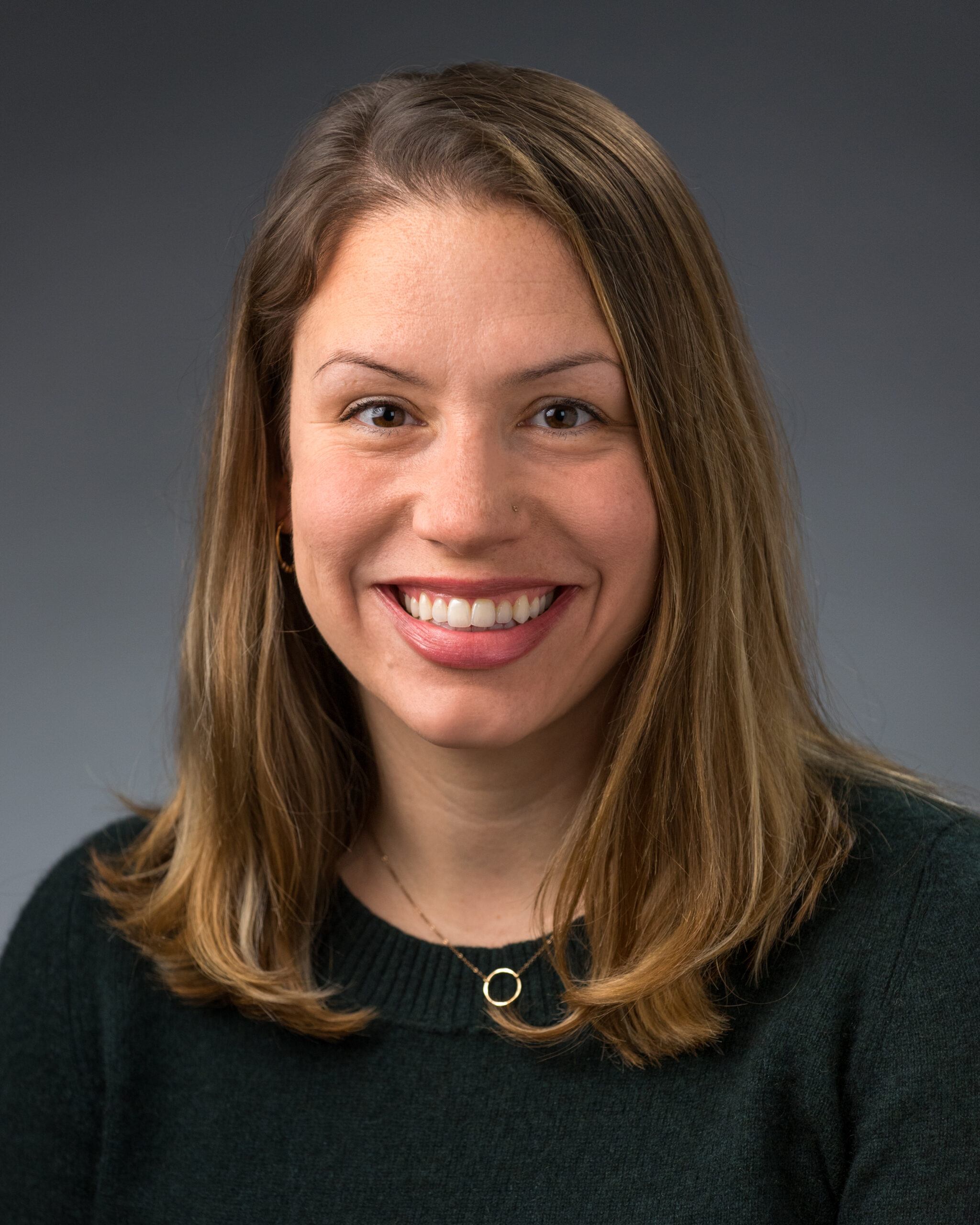 Dunia Faulx and the Jefferson Healthcare Dental Clinic Team
Dunia Faulx and the Jefferson Healthcare Dental Clinic Team Port Townsend, Washington
Jefferson Healthcare was one of Washington’s first rural health systems to work jointly with public health and to pull together a multi-sector community team to tackle top-priority health issues for the population. Dunia has been the spark and vision behind many population health initiatives, leading population health work far before other rural health systems awakened to the need for a role like hers.
I am the Chief Planning and Advocacy Officer at Jefferson Healthcare, a rural Critical Access Hospital that provides all healthcare for the residents of East Jefferson County. With the support of Jefferson Healthcare leadership, specifically CEO Mike Glenn and Dr. Joe Mattern, I started the Population Health Department in 2016 (the first in the state), focusing on housing, food insecurity, and social isolation. We now touch on various health determinants, including transportation, early childhood, climate change, and equity. We also lead a thriving advocacy program that supports local, state, and federal advocacy and policy change for rural healthcare – at our agency and more broadly.
In 2016, Jefferson Healthcare partnered with Jefferson County Public Health to perform a Community Health Needs Assessment. Access to dental care, specifically for the adult Medicaid population, was identified as a key need for our community. Staff worked with the Washington State Hospital Association and the Washington State Legislature to establish a dental encounter rate to pay Rural Health Clinics to provide dental care to Medicaid enrollees. Ultimately successful (with the support of a State appropriation and a HRSA Oral Health Workforce Activities grant), we were the first to open a dental clinic embedded within a Rural Health Clinic. The breadth and depth of partnerships that supported this initiative were incredible; the Jefferson Healthcare dental team is proud to serve thousands of dental clinic patients annually and is currently exploring options to expand our dental service line and reach remote populations with a mobile dental unit.
Jefferson Healthcare provides full spectrum reproductive healthcare, SANE (Sexual Assault Nurse Examiner) services, integrated behavioral health services within our primary care clinics, and many others. We have continued to push the boundaries for what healthcare can and should provide in a rural setting.
The “Power of Rural” is the inherent strength that rural communities, healthcare systems, and citizens have when difficult problems and opportunities arise. It is the ability of rural agencies to come together no matter the problem, find a solution, and implement it.
The State Office of Rural Health is a key partner in all of Jefferson Healthcare’s work. We deeply appreciate the thought partnership, connections, and support they provide. We would never have been so successful if I didn’t have the opportunity to call up the WA State Office of Rural Health and say, “Hey, I have a wild idea…what if we did this to support our community?” and always receive a “Yeah, go for it!” in response.
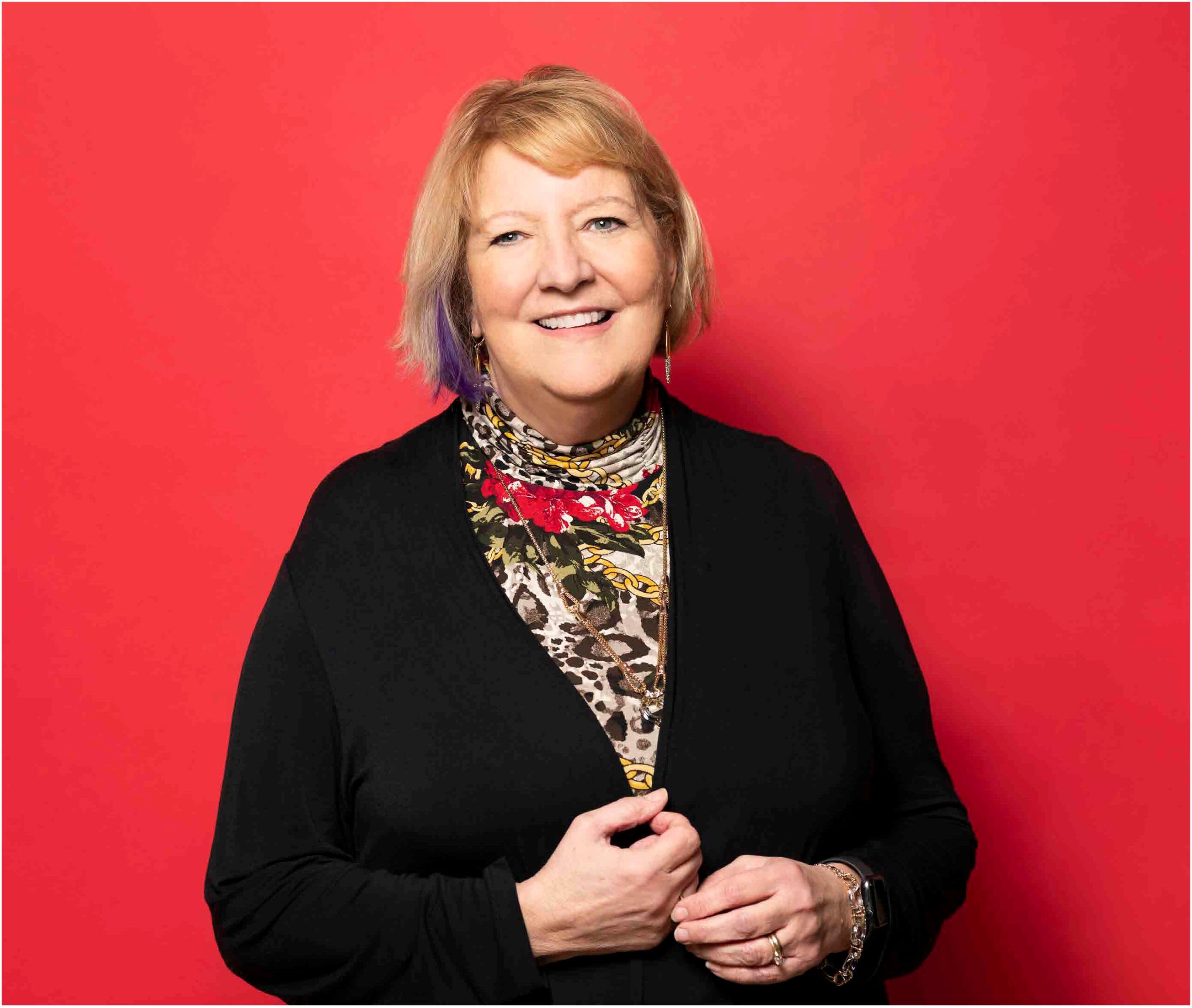 Sharon Lansdale, R.Ph., MS
Sharon Lansdale, R.Ph., MS President/CEO Emeritus, Advisor Rural Health Initiatives
The Center for Rural Health Development, Inc.
Hurricane, West Virginia
Sharon joined the Center for Rural Health Development, Inc., in 1995 and brings over 40 years of experience in health and health care resulting from her work in private and public health sectors. Though retiring in July 2023, she will continue her work at the Center as Advisor of Rural Health Initiatives, President/CEO Emeritus, over the next several years. Before entering public health, Sharon worked as a hospital pharmacist, including serving as the director of pharmacy at a hospital in Charleston. She was engaged in educating patients with diabetes about how to manage their diabetes once discharged from the hospital. This led her to the WV Bureau for Public Health, where she developed the Bureau’s first diabetes control program. After serving as a consultant at the Bureau for several years, she became the Director of the Division of Health Promotion and Chronic Disease Prevention, where she managed the development of several chronic disease control and community health improvement programs.
We focus on the linkages between both health/healthcare and economic development. In 2018, recognizing that community health and economic prosperity are inextricably linked, the Center launched Wild, Wonderful and Healthy West Virginia. Through this program, the Center works to strengthen the capacity of communities to improve the health of residents and create a community culture that supports entrepreneurial and small business development.
The Center created the WV Rural Health Infrastructure Loan Fund to provide a source of affordable capital financing for healthcare providers and organizations in the state. Since 2001, the Center has partnered with banks and other funders to leverage over $65 million in healthcare infrastructure improvements in the state with less than 0.01% losses. The success of the Loan Fund is attributable to the many funders, other financers and loan committee members who share our vision for a healthy West Virginia.
West Virginia is one of the most rural states in our nation, so to attract businesses and the jobs that come with them, we need to move WV out of the bottom of the most unhealthy states in the nation. This will not be accomplished if we don’t focus on creating environments in our rural communities that not only support the health of our residents but also support small business and entrepreneurial development. The Wild and Wonderful part of our state is our beautiful rural communities.
The Center has a very close relationship with the West Virginia Office of Rural Health. When unmet needs or challenges are identified, we work together to identify which organization is best equipped to take the lead, with the support of the other organizations.
 Caroline Hickerson, MA
Caroline Hickerson, MA Executive Director
Wyoming Health Resources Network
Cheyenne, Wyoming
As the executive director of the Wyoming Health Resources Network (WHRN), a non-profit organization, I wear many hats. I work closely with all of the University of Wyoming College of Health Science programs, which includes the medical school program through the University of Washington (WWAMI), the WICHE MD, DO, PA, Dentistry, Optometry, PT and OT programs, the Family Residency programs throughout the State and lastly, the DNP program. WHRN works closely with students in these programs to share workforce data and job opportunities to help them stay or return to Wyoming when they complete their education. Additionally, I run our 3RNET database as Wyoming’s Statewide Coordinator and facilitate networking events for healthcare professionals and administrators.
Wyoming’s primarily rural landscape makes recruiting and retaining our healthcare providers a difficult and much-needed mission. By helping to educate healthcare professionals about opportunities in the state and connecting them continuously with healthcare organizations, WHRN works to build relationships to improve our rural recruitment and retention strategy.
Recently, WHRN partnered with Elevate Wyoming to conduct a comprehensive needs assessment to identify recruitment and retention strategies that will help draw and keep healthcare professionals across the state. We worked closely with healthcare administrators and professionals in every county to complete the survey and then shared that valuable data at the 2023 Power of Rural Conference. The full report was sent to all Wyoming healthcare organizations within the state so they could use that information to direct their recruitment and retention efforts.
During COVID, there was very little recruitment. Then, as recruitment started back up, hospitals in the state had to make drastic cuts to keep their doors open, such as closing their Labor and Delivery units and ceasing all OB-GYN recruitment. This was extremely difficult for OB-GYN physicians in residency programs who had planned to return to Wyoming for work. WHRN worked closely with those physicians to help them identify and connect with existing positions and provide career coaching on the current OBGYN landscape for those who had not yet matched.
To me, it means how rural communities come together and combine their resources to provide incredible care and resources.
I have a fantastic relationship with the Wyoming Office of Rural Health. Through a contract with our SORH, WHRN can provide 3RNET and recruitment for primary care providers at no cost. This is an incredible benefit for all who live in Wyoming.